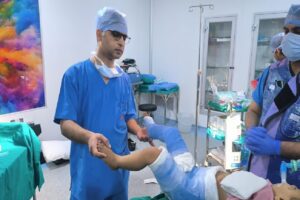The Crucial Role of Paediatric Surgery

Paediatric surgery is a specialized field of medicine that focuses on surgical interventions for infants, children, and adolescents. It plays a crucial role in diagnosing, treating, and managing various surgical conditions in the pediatric population. Paediatric surgeons possess unique expertise in addressing the specific anatomical, physiological, and emotional needs of young patients. In this blog post, we will explore the significance of paediatric surgery and highlight its critical role in improving the health and well-being of children.
Treating Congenital Anomalies
Congenital anomalies, also known as birth defects, are structural or functional abnormalities that occur during fetal development. Paediatric surgery plays a vital role in correcting these anomalies, such as heart defects, cleft lip and palate, spina bifida, and gastrointestinal malformations. Early surgical intervention in congenital anomalies can significantly improve the long-term outcomes and quality of life for affected children.
Surgical Management of Trauma
Children are susceptible to injuries and accidents that may require surgical intervention. Paediatric surgeons are trained to handle a wide range of traumatic injuries, including fractures, abdominal injuries, head injuries, and burns. Their specialized knowledge ensures that appropriate surgical procedures are performed with precision and care, minimizing complications and optimizing recovery for young patients.
Treatment of Pediatric Cancers
Childhood cancers require a multidisciplinary approach, with paediatric surgery playing a vital role in diagnosis, staging, and treatment. Paediatric surgeons collaborate with oncologists, radiologists, and other specialists to perform surgical resections of tumors, biopsy procedures, and placement of central venous access devices for chemotherapy. These surgical interventions are critical in managing pediatric cancers and improving the chances of successful treatment and long-term survival.
Management of Acute and Chronic Abdominal Conditions
Children can experience a variety of acute and chronic abdominal conditions that require surgical intervention. These conditions include appendicitis, intestinal obstructions, gallbladder diseases, and inflammatory bowel diseases. Paediatric surgeons are skilled in performing procedures such as appendectomies, bowel resections, and minimally invasive surgeries, which allow for quicker recovery and reduced postoperative pain in young patients.
Repairing Complex Urogenital Anomalies
Paediatric surgeons also specialize in the surgical management of complex urogenital anomalies. These may include conditions such as hypospadias (abnormal placement of the urethral opening in boys), undescended testes, urinary tract obstructions, and genital abnormalities. Surgical interventions in these cases aim to restore normal function and improve the overall quality of life for affected children.
Minimally Invasive Surgery in Children
Advances in technology have led to the development of minimally invasive surgical techniques in paediatric surgery. These procedures involve smaller incisions, reduced postoperative pain, and faster recovery times compared to traditional open surgeries. Minimally invasive techniques are commonly used for conditions such as appendicitis, hernias, and urological disorders, providing excellent outcomes and improved cosmetic results for children.
Conclusion
Paediatric surgery plays an indispensable role in the care and well-being of children. By addressing congenital anomalies, treating traumatic injuries, managing pediatric cancers, and providing surgical interventions for various abdominal and urogenital conditions, paediatric surgeons contribute significantly to improving the health outcomes of young patients. Their specialized knowledge, expertise, and compassionate approach ensure that children receive the best possible surgical care. With ongoing advancements in surgical techniques and technology, paediatric surgery continues to evolve, further enhancing the outcomes and quality of life for children in need of surgical intervention.





